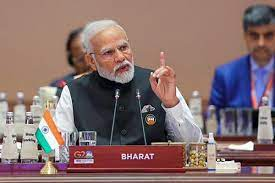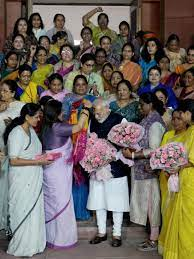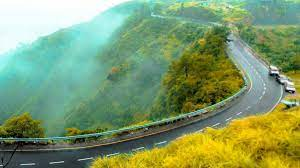Happy New Year ::: A Year 'decisive' ... for Bharat ::: But what's Bharat in the new world order ?
Circa 2023 marked many firsts for female officers in the military– women were given command roles, became part of the crew of warships, and were deployed in Siachen !!
Bharat is a term for a country which is far more aware and respectful about its own traditions, culture and heritage...which is very much capable of taking independent positions which will chart its own way in the new world order.
"There is a shift both in intent and content towards a Atmanrbhar Bharat ...," -- says Dr S Jaishankar, External Affairs Minister.
But still there is a long way to go !!
Women empowerment:
We in India, that is Bharat, call it Matri Shakti.... the English equivalent for the phrase will be Mother Power ! It's so crucial in the new century and of course in the new world order.
The circa 2023 was vital as the Women Reservation Bill was passed by Parliament in a specially convened session in the new Parliament Building.
But reference to the international standard on the same issue is also relevant.
An official booklet circulated some years ago by the Rajya Sabha Secretariat said
"it is an accepted fact that without being proportionately present in the political
system", a group or women's ability to influence policy making is rather "limited".
This brings us to the debate on the need for the Women Reservation Bill. At the global stage, equal participation of women and men in public life was one of the cornerstones of the Convention on Elimination of All Forms of Discrimination against Women (CEDAW) adopted by the UN General Assembly (UNGA) in 1979. India is a signatory to the convention.
But it is also true discrimination in matters of representation of women in decision-making, that
is power-politics bodies, continued. Of course the official explanations have been that different
policy measures were/are being introduced to bring about gender balance in political institutions.
About 20 years back and more; this issue used to be discussed and debated even at international
levels. Initially, a smaller number of seats were reserved in some countries but this did not help.
Thus, it was thought to be increased.
Surveys had revealed that women constitute more than 50 percent of the population in most countries but worldwide they held only less than 16 percent of the parliamentary seats.
Here to cite instances, in Uganda, 56 seats - one elected in each district was introduced.
In Tanzania, 20 percent of the seats were reserved for women. In some countries, also a different methodology was adopted. Reserved seats could be easily filled by appointment as in Kenya and even some Arab countries.
It goes without saying that today Indian women hold high position in every walk of life - from administration to armed forces and from entrepreneurship to education. Several women leaders have been successful Chief Ministers and led the political parties -- often not with 'feminine gloves'.
The story itself is a tale of successful saga. From incumbent Indian President Droupadi Murmu to Capt Lakshmi of Azad Hind Fauz, our women leaders have come a long way in politics. But there have been challenges too.
The feudal mindset of Indian male have often prevented effective implementation of key reforms undertaken from time to time. But Bharat is changing fast !
A vital point often missed in debate and media discussions is that the women in India began to play important roles in governance and in corridors of power long before many 'mature democracies' could ensure that.
The Americans despite their self-proclaimed virtuous role and claims are yet to get a woman President. Hillary Clinton, wife of a former President Bill, lost to Barack Obama. Britain had its first woman Prime Minister Margaret Thatcher more than a decade after India threw up Indira Gandhi in 1966.
Margaret Thatcher and Indira Gandhi in 1982, two years before the raid in Amritsar, which left hundreds dead. (The Guardian snap)
Remarkably, according to senior journalist R C Rajamani (also my guru in more ways than one); -- "To the media Indira Gandhi remained an enigma. During her lifetime, the media, hated, loved and admired her with equal intensity at different times".
Ten years back, India stood at number 10 at the global stage in economy. Today, India is at number 5 and the stage is virtually set to reach the prestigious rank 3rd (third). The GST was a major decision in calendar year 2017. More reforms are on cards.
In 2016, apprehensions were expressed that like China, Indian economy could also slip rather than take off. It was argued that if China goes down, it will hit developed nation like the US an will also take 'developing nations' like India alongside. But India has braved through the situation.
Of course, none can grudge Prime Minister Narendra Modi for stating that: the infrastructure creation is happening at a "never-seen-before pace, and all sectors are doing much better than how they were 10 years ago".
Of course there are issues related to these matters as well. There is competitive welfarism — analysts better call them freebies, cash-transfers, and election related guarantees.
For its part, the ruling dispensation under BJP has rolled out the Viksit Bharat Sankalp Yatra, a nationwide mass contact campaign to spread information and raise awareness about new government schemes.
These will make the voters aware of measures and steps taken such as Mudra loans, housing, food security, and healthcare to LPG cylinders, pensions, and clean drinking water.















No comments:
Post a Comment